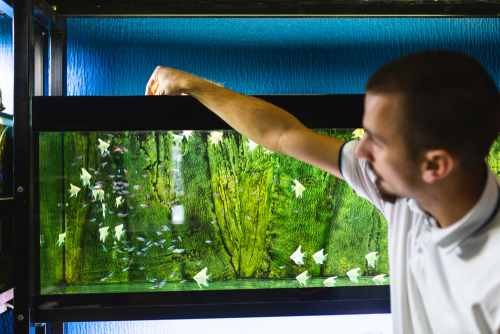Check out these other related posts:
- Aquarium Fish For Beginners
- How to Ensure Your Goldfish Thrives for 15 Years
- The Ultimate Guide to Setting Up Your First Fish Tank
Fishkeeping is a rewarding and fulfilling hobby that allows us to create miniature aquatic worlds within our homes. However, it’s essential to recognize that the well-being of our aquatic companions depends on our responsible actions.
Contents
Things Fish Keepers Should NEVER Do
To help you navigate the intricacies of fish keeping, we’ve compiled a list of 10 crucial things fish keepers should never do. By avoiding these pitfalls, you’ll be on your way to providing a safe and healthy environment for your aquatic friends.
1. Never Overstock Your Tank
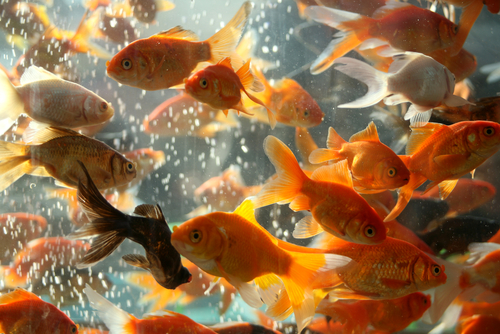
Overstocking a fish tank is a recipe for disaster. Each fish requires adequate space to swim, establish territory, and reduce stress. An overcrowded tank leads to increased waste production, compromised water quality, and heightened aggression among fish.
Research the adult size of each species and consider their compatibility to ensure a harmonious and balanced tank.
Furthermore, overstocking your fish tank is akin to overfilling a small room—stress and disease can quickly spread. To maintain a healthy aquatic environment, I’d recommend regular monitoring of both water conditions and fish behavior. A well-planned tank will benefit both the health of your fish and the aesthetic appeal of your display.
2. Never Skip the Aquarium Cycling Process
Cycling a tank is an essential step before introducing fish. This process establishes beneficial bacteria that break down harmful ammonia and nitrites.
Skipping or rushing the cycling phase can result in toxic conditions, stress, and even fish fatalities. Allow the nitrogen cycle to complete naturally before adding any fish.
3. Never Neglect Water Quality
Water quality is paramount to the health of your fish. Regularly test for ammonia, nitrites, nitrates, and pH levels using reliable testing kits.
Ignoring poor water conditions can lead to stress, diseases, and shortened life spans for your fish. Perform regular water changes and maintain the appropriate water parameters for your specific fish species.
4. Never Overfeed Your Fish
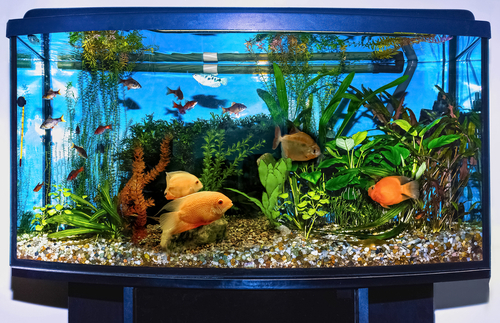
Overfeeding is a common mistake that can lead to polluted water and health issues. Only feed your fish what they can consume in a few minutes, and monitor their behavior to gauge their appetite.
Uneaten food quickly breaks down and contributes to ammonia buildup. A balanced diet and proper portion control are essential for fish health.
To keep your fish in optimal health, adopting a regular feeding schedule is a worthwhile endeavor. Offering small but frequent meals is preferable, as it resembles how fish naturally forage and eat in the wild. Keep an eye on them during feeding times: leftover food indicates that you may need to adjust the serving size slightly.
Regularly observing your fish at feeding times offers additional insights into their overall health and behavior, making it a valuable routine. By employing this systematic approach to feeding, you’ll create a harmonious environment where your fish can thrive.
5. Never Neglect Quarantine
Introducing new fish to your tank without quarantine can introduce diseases and parasites that threaten your existing fish.
Set up a separate quarantine tank to observe and treat new arrivals before introducing them to the main tank. This practice prevents the spread of potential health problems.
6. Never Disregard Compatibility
Research and understand the compatibility of fish species before adding them to your tank. Aggressive or territorial fish can wreak havoc on more peaceful tankmates.
Incompatible fish may stress each other, weakening immune systems and disease susceptibility.
7. Never Use Harsh Chemicals
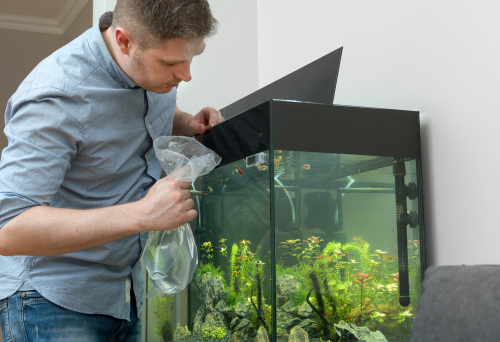
Using household cleaning products or chemicals near your tank can lead to water contamination, harming your fish. Even seemingly harmless substances can have adverse effects on aquatic life.
Use only aquarium-safe products for cleaning decorations, equipment, and tanks. To best safeguard the health of your fish, a prudent approach to tank cleaning and maintenance is critical. Opt for aquarium-specific cleaning products that have been carefully formulated to support your tank’s fragile ecosystem.
These products balance efficacy and gentleness, ensuring your fish enjoy a clean yet non-stressful habitat. Pay attention to the importance of label reading. It’s best to mark any additives or cleaning agents explicitly as safe for aquatic life.
To err on caution, you might also explore natural cleaning alternatives, such as vinegar-based solutions, which can be equally effective but far less hazardous for aquatic residents. This multifaceted approach to aquarium maintenance promotes a thriving, balanced environment that you and your fish will appreciate.
8. Never Neglect Tank Maintenance
Regular maintenance is vital to a successful fish tank. Neglecting tasks like water changes, filter cleaning, and algae removal can lead to deteriorating water quality and health problems for your fish.
Set up a routine maintenance schedule to keep your tank in optimal condition.
To keep your fish flourishing in an optimal setting, it’s crucial to have a consistent maintenance regimen in place. Plan for regular water changes—every two to four weeks is a good rule of thumb, although the exact frequency will depend on the size of your tank and the number of fish.

During each change, make it a point to remove any debris from the substrate and replace it with water that’s been conditioned and temperature-matched to the existing tank water.
Maintaining the filter is another critical aspect; do so regularly to ensure adequate water circulation and filtration. Remember to rinse or replace filter media per the manufacturer’s guidelines. Pay attention to the importance of keeping an eye on algae buildup; use scrapers or specialized brushes to keep it in check.
By sticking to these maintenance guidelines, you’re not just ticking off a checklist—you’re preserving the quality of the water and, by extension, promoting a lively, thriving home for your aquatic friends.
9. Never Ignore Signs of Stress or Illness
Vigilance is essential when it comes to monitoring the health of your fish. Address any signs of stress, illness, or unusual behavior promptly. Isolating sick fish and seeking proper treatment can prevent the spread of disease and increase the chances of recovery.
10. Never Rush or Make Impulsive Decisions
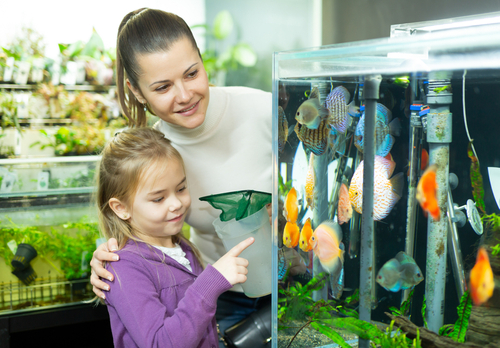
Fishkeeping requires patience and careful planning. Rushing into decisions, such as adding new fish without research or changing tank setups abruptly, can lead to stress and negative consequences.
Take the time to research, plan, and make informed choices for the well-being of your aquatic friends.
Conclusion
Fish keeping is a privilege with a responsibility to provide the best possible care for our aquatic companions. By avoiding these 10 critical mistakes, you’ll be well on your way to creating a thriving and harmonious marine environment.
Remember, a healthy tank depends on proper research, maintenance, and respect for the delicate balance of nature within your aquarium.

Veteran fish keeper and keen hobbyist with a serious case of MTS. My midlife crisis was the establishment of a fish room, much to my wife’s horror. Little does she know it could be worse!!


